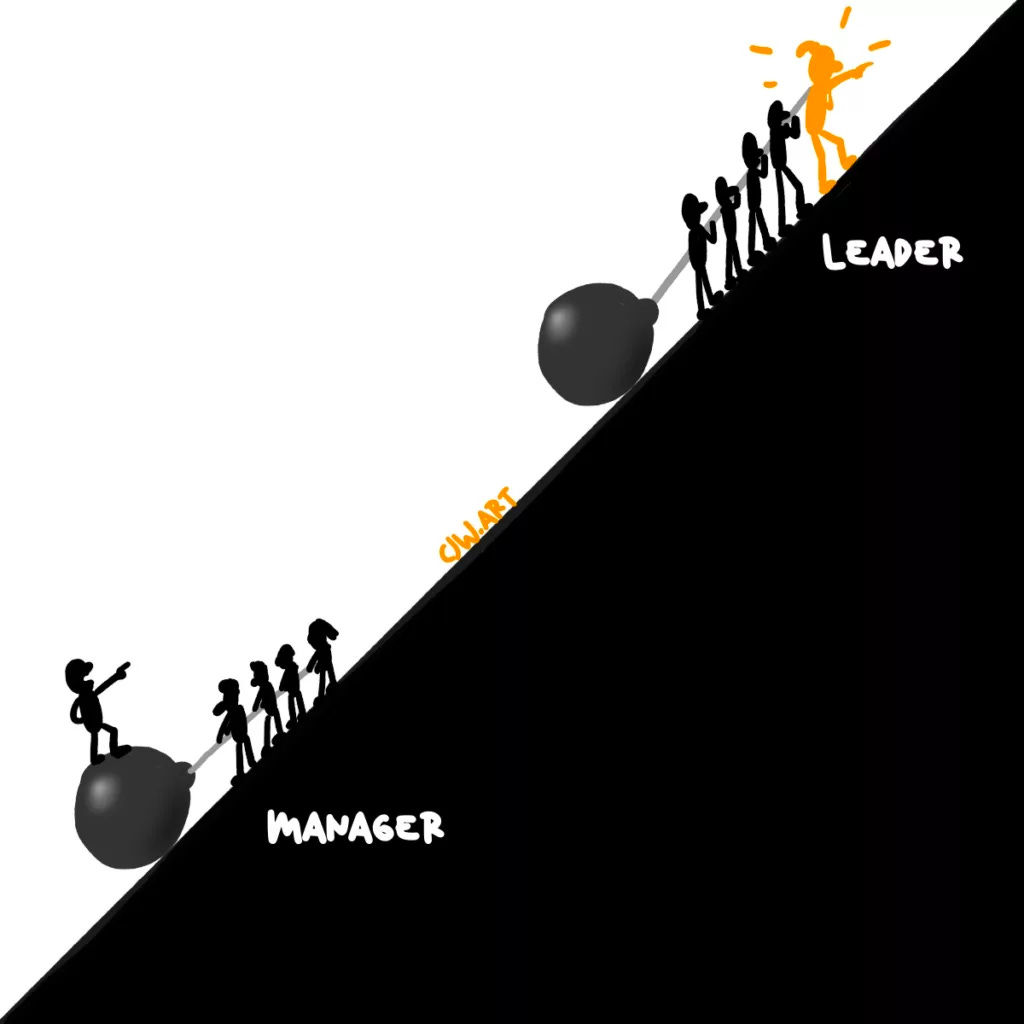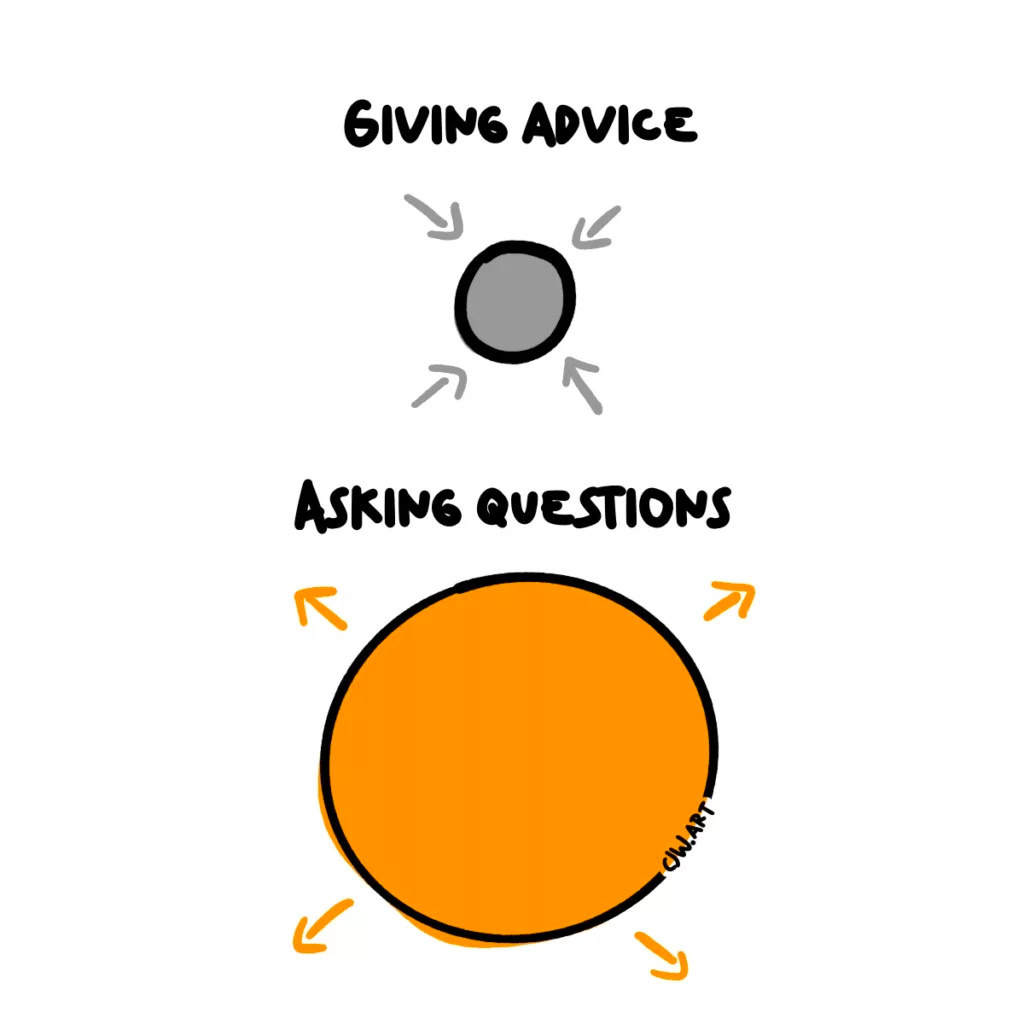10 leadership lessons every new manager should pin to their wall
(They can help experienced managers too)
I made mistakes when I had my first management position.
Don't get me wrong, I wasn't a terrible micro-manager, but I was figuring things out as I went along with the mentoring of my boss.
Still, I wish someone had taken me aside and taught me some of the fundamentals so I wouldn't have had to make those mistakes myself.
That's my hope with this series of visuals.
And even if you're an old pro, I hope there's something here that will inspire you this week.
1. Lead yourself first
You can't lead a team if you can't lead yourself.
The world is fed up with hypocrites who place burdens on others which they themselves would never do. While we all have growth areas, it's crucial to have the self-awareness to recognise and work on them.
Leading yourself means knowing where you are, knowing where you're going and enacting a plan to get there.
All essential skills for leading others.
2. Lead from the front
Good leaders get people to achieve their goals, great leaders inspire followers to pursue the same goal.
Servant leadership is that second model.
It focuses on releasing people's potential and drive while setting the example of behaviours and performance you want to show in other people. It's not about having the same skills or gifts, but the same attitude.
Model the behaviours you want others to live.
3. Don't listen to reply, listen to understand
Okay, be honest. How often are you really listening just so you can reply?
Too often, we are already working out our clever response rather than taking the time to actually listen. And when we do that, we misunderstand, make assumptions, and create an adversarial environment where people don't want to listen to us.
In the 7 Habits of Highly Effective People, Stephen Covey teaches the idea of empathetic listening in his chapter "Seek first to understand, then be understood."
Here's a quick summary from a podcast episode.
4. Focus on reasons to praise, not criticise
I used to teach kids from 5-18 (and adults too!)
In every class there would be at least one "difficult child". You know the ones — bums rarely on chairs, amazing at inventing new games, asks a million questions when you're trying to explain something. Yeah, those kids.
While there are a ton of strategies for class management, the one that always worked the best was "catch me being good".
And it's useful for managers too.
It's easy to find mistakes and faults.
After all, pobodies nerfect. While there's a place for giving correction and negative feedback, it can too easily become the only feedback we give. And that's demotivating and also not that effective.
When we focus on what people are doing right, we help people work out their "win conditions" and give them something positive to focus on.
It's not failproof, but it's a good rule of thumb.
(Not convinced? Find out more about this idea from The One Minute Manager)
5. Focus on providing autonomy, mastery and purpose to motivate your team
There are two kinds of motivation.
Extrinsic, where you're motivated by what the thing does for you (i.e. getting a promotion, earning money, not being fired)
Intrinsic, where the process of doing the thing is the reward.
Many managers focus on extrinsic factors to help motivate people, but that's a mistake. Intrinsic motivation is far more powerful. After a certain point, the promise of being paid more isn't motivating for most people (yes, there are exceptions). And even when does motivate, it can prevent people from thinking creatively.
In his book Drive, Dan Pink lays out the three key components of modern motivation.
Mastery: becoming better at a skill
Autonomy: freedom to choose tasks
Purpose: the knowledge that the work you do makes a difference.
To motivate employees today, focus on providing these three needs.
6. What works for you might not work for them
How do you like to get feedback?
Maybe you like to hear the issue upfront so you can fix it ASAP. Or perhaps you prefer a praise sandwich where every actionable point needs to be nestled between a positive and a note of encouragement?
What about starting a regular meeting? Do you prefer to jump straight in (and maybe have some small talk after) or perhaps you prefer a bit of small talk so you can feel ready to discuss more important matters?
Well whatever your preference is, it might be the opposite of those you work with.
As a leader, you need to work out how they prefer to work and do your best to accommodate those preferences.
Sure, sometimes you won't be able to (if person X likes one thing but Y the opposite, someone's going to have to adapt) but being aware can help you get the best out of people.
7. Ask questions instead of jumping to give advice
There's an old saying.
You have two ears and You have two ears and one mouth, so listen twice as much as you speak.
If you're a manager, you've proven your knowledge.
But even when you have the answers, it's better not to jump into giving advice. When you ask guiding questions, you can help people find their own answers.
This helps them grow and become more independent so they don't rely on you to fix their problems all the time.
If you want to get better at it, check out this summary of the book The Coaching Habit.
8. Block time for Deep Work
As a manager, your time is not your own. There are those you report to and those who report to you who "need you" at any moment.
If you're not careful, you'll spend all your time being reactive, not proactive.
At its worst, this means the important tasks, the ones that require time and focus — and that you're often judged for — get neglected.
The alternative: blocking time in your calendar for Deep Work.
Deep work is an idea from Cal Newport (author of Digital Minimalism) that the most high-value work we can do requires time and focus. We need to set (and protect) time in our calendar for these tasks so we can complete them.
9. Create an environment of psychological safety
Psychological safety is where you feel you won't be punished for speaking up or taking risks.
When it's absent, people play it safe, focusing on not making mistakes rather than doing the best work. This not only leads to bland work, but people stick to their roles and pass the blame on to others.
You need to
Welcome discussion of problems
Discuss challenges without judgement
Celebrate learning from mistakes
Praise risk-taking
And model the behaviours you wish to see in your team.
10. Encourage continuous development
There's an old tale
"What if we invest in people and they leave?"
"What if we don't invest in them and they stay?"
It gets to the heart of why continuous development matters but comes back to some of the previous lessons.
People are motivated to achieve mastery, by giving them new opportunities and challenges you help them towards that goal, increasing their motivation.
And if you're leading by example, they won't be a "threat" to you.
Found these useful?
If you've found these tips useful, I'd love it if you helped others discover them by showing some love on Twitter (X), Instagram, or LinkedIn.
Or you can forward them to a friend.
And make sure you sign up for my newsletter to get the next series of visuals delivered directly to your inbox.















Great article and visuals! I just wrote my first post on leadership. Putting a shameless plug here!
https://pressingforward.substack.com/p/the-surprising-truth-about-leadership?r=2iaybf
Damn, all the books refered I got, but still, I learned alot visually by the amazing art. Thanks for sharing!